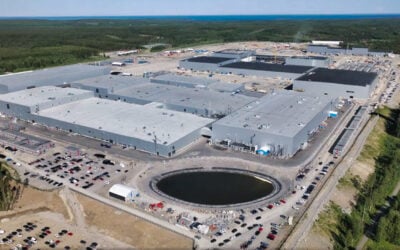Panasonic is building Fujisawa Smart Town in Japan. Image: Panasonic.
While seeming “tech breakthroughs” garner a great deal of media attention, the three key factors in determining the likely impact of storage tech companies are innovative technology, scalability and a proven track record, a Bloomberg New Energy Finance analyst has said.
Logan Goldie-Scott, head of energy storage analysis at BNEF, consulted with PV Tech Power writers Ben Willis and Andy Colthorpe for a feature article in the seventh volume of the downstream solar technology journal.
Goldie-Scott and GTM Research analyst Brett Simon looked at over 20 companies with different technology offerings across the residential, commercial, utility-scale and off-grid / microgrid segments.
“When assessing new companies, we are not looking for great ideas which are simply impossible to implement or are ahead of their time,” Goldie-Scott said.
Try Premium for just $1
- Full premium access for the first month at only $1
- Converts to an annual rate after 30 days unless cancelled
- Cancel anytime during the trial period
Premium Benefits
- Expert industry analysis and interviews
- Digital access to PV Tech Power journal
- Exclusive event discounts
Or get the full Premium subscription right away
Or continue reading this article for free
BNEF is interested in companies with proven track records that have “innovative solutions” to address “big opportunities”, the analyst said.
Storage companies that ‘tick all the boxes are incredibly impressive’
Companies covered by the analysts include Redflow, maker of what is thought to be the world’s first flow battery aimed at the residential market, which Goldie-Scott considered “fascinating” but thought it faced a real challenge to displace lithium-ion’s market share and GTM’s Brett Simon said was still representative of a technology that needs to be proven.
Other selections include Tesla, Sonnen, Panasonic and Sunverge, all companies best known in storage for serving the residential sector, but each with very different offerings to market. Panasonic, for instance, appears to be planning an all-out assault on Japan’s smart home market, expected to take off around 2020 as the country introduces a zero energy homes standard for all new residences.
Sunverge, on the other hand is aggressively pushing its virtual power plant-ready energy storage systems into Australian and US markets and while Panasonic and the others are also keen to enable aggregated behind the meter storage systems to act as a bigger resource, Sunverge has in the past few months attracted significant investment from Australia’s biggest utility company, AGL.
While the industry includes novel but already-commercial tech solutions, such as Aquion’s rechargeable “saltwater” batteries which are appearing in a handful of off-grid installations and quickly proving themselves, to the likes of Green Charge Networks and Saft which have attracted major investors to help them to scale up, the energy storage industry’s leading edge players are those which can meet the necessary criteria.
“Many energy storage technology companies are clearly innovative but have yet to show they can scale, and momentum is often lacking. The ones that tick all these boxes are incredibly impressive,” BNEF’s Logan Goldie-Scott said.
The ’20 energy storage disruptors’ feature article can be read in full in PV Tech Power Volume 7. Email publisher Solar Media for enquiries regarding hard copies, or subscribe here to read the latest volume as it goes online in the next few days.
Australian entrepreneur Simon Hackett launched Redflow’s Zcell residential flow battery earlier this year. Image: Redflow.





